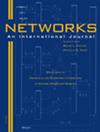Selecting fast algorithms for the capacitated vehicle routing problem with machine learning techniques
IF 1.3
4区 计算机科学
Q4 COMPUTER SCIENCE, HARDWARE & ARCHITECTURE
引用次数: 0
Abstract
We present machine learning (ML) methods for automatically selecting a “best” performing fast algorithm for the capacitated vehicle routing problem (CVRP) with unit demands.利用机器学习技术为容车路由问题选择快速算法
我们提出了机器学习(ML)方法,用于为有单位需求的有容量车辆路由问题(CVRP)自动选择性能 "最佳 "的快速算法。算法选择是在算法组合中自动选择预计对给定问题实例效果最佳的算法,算法配置是自动选择预计对给定问题实例效果最佳的算法参数。我们提出了一个包含算法选择和组合配置的框架,其中包括自动配置的 "横扫算法"、混合遗传搜索算法首次生成的可行解,以及克拉克和莱特算法。自动选择的算法可在极短的运行时间内提供高质量的可行解决方案,因此非常适合实时应用,也非常适合为 CVRP 的全局优化方法生成初始可行解决方案。这些结果预示着利用 ML 改进组合优化方法的有效性。
本文章由计算机程序翻译,如有差异,请以英文原文为准。
求助全文
约1分钟内获得全文
求助全文
来源期刊

Networks
工程技术-计算机:硬件
CiteScore
4.40
自引率
9.50%
发文量
46
审稿时长
12 months
期刊介绍:
Network problems are pervasive in our modern technological society, as witnessed by our reliance on physical networks that provide power, communication, and transportation. As well, a number of processes can be modeled using logical networks, as in the scheduling of interdependent tasks, the dating of archaeological artifacts, or the compilation of subroutines comprising a large computer program. Networks provide a common framework for posing and studying problems that often have wider applicability than their originating context.
The goal of this journal is to provide a central forum for the distribution of timely information about network problems, their design and mathematical analysis, as well as efficient algorithms for carrying out optimization on networks. The nonstandard modeling of diverse processes using networks and network concepts is also of interest. Consequently, the disciplines that are useful in studying networks are varied, including applied mathematics, operations research, computer science, discrete mathematics, and economics.
Networks publishes material on the analytic modeling of problems using networks, the mathematical analysis of network problems, the design of computationally efficient network algorithms, and innovative case studies of successful network applications. We do not typically publish works that fall in the realm of pure graph theory (without significant algorithmic and modeling contributions) or papers that deal with engineering aspects of network design. Since the audience for this journal is then necessarily broad, articles that impact multiple application areas or that creatively use new or existing methodologies are especially appropriate. We seek to publish original, well-written research papers that make a substantive contribution to the knowledge base. In addition, tutorial and survey articles are welcomed. All manuscripts are carefully refereed.
 求助内容:
求助内容: 应助结果提醒方式:
应助结果提醒方式:


